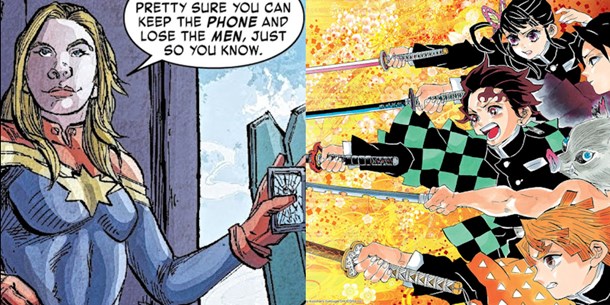
Be in no doubt, I love comics. At the age of 7, my Mum gave me a suitcase full of hundreds of Silver Age US comics purchased at Leeds Market when she was a girl, and I inherited a treasure trove of amazing stories, characters and strange adverts for things I'd never heard of, like Tootsie Rolls. America was an alien place, but man I loved their heroes. It encouraged my love of reading and fired my imagination - there was simply no power on Earth that could take down Batman, Superman or the Teen Titans.
Yet over the last couple of years, the stratospheric rise of manga has seen the format dominate US sales charts, with American comic sales falling into a black hole. So are Western creatives in a serious lull, or has the culture just shifted away from the colourful superheroes of yesteryear?
THE SAD STATE OF US COMICS
Manga sales in the US grew by 26% in 2019 and by 44% in 2020 according to Statista, Much of this is laid at the feet of Demon Slayer, which in total sold 82.34 million books worldwide in 2020, against approx. $82 million for the US comic industry in total. It's approximate because with Diamond Distributors no longer in sole control of distribution for US comic books, sales are now fractured.
That's ONE manga title outselling the combined might of Marvel, DC and Dark Horse. Bloody hell.
According to ICv2, a geek business site, the growth of US manga sales in 2021 was 160%, totalling 24.4 million units sold in that country alone.
It's also worth noting that US comic companies do not consider the end-user to be their customer - their sales are made up of what they sell to comic book shops, regardless of whether they are then sold on to consumers. Other "customers" include library groups and schools, basically anyone who doesn't have to actually read a copy. In order to create good news stories for sales, comic companies are now including manga and graphic novels in their "industry" sales figures to paper over the cracks - it's easy to look good I suppose when you steal figures from your competition.
Remember too that US comics indulge in "Incentive covers", which are packed in relation to how many regular comics are ordered - sometimes to get 1 incentive comic, the retailer must order 25, 50 or even 100 regular comics, which leads to massive prices on the desirable covers, and a lot of landfill. Specialty comic retailers like Sad Lemon and Limited Edition Comics specialise in these rarities, and I have to confess I collect incentive covers because I love the art - where possible I buy direct from J Scott Campbell, Tyler Kirkham and Rachta Lin, but I rarely read the stories within. While I love the art and the characters, the writing often leaves me cold.
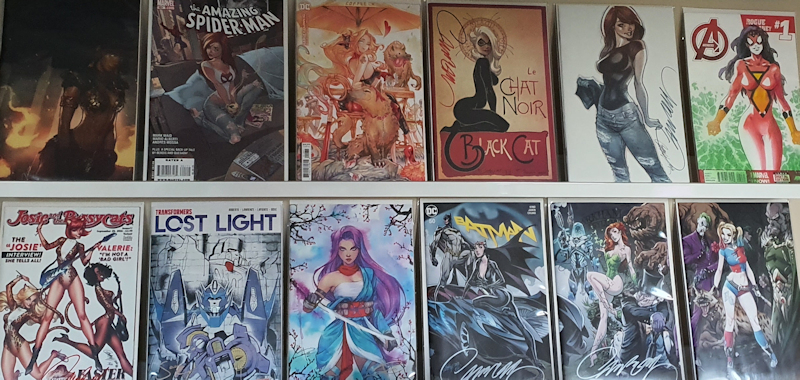
Incentive covers are undoubtedly boosting comics sales while their "standard" versions sit in landfill. Sadly I'm guilty of contributing - those are just 2 of 4 shelves in my office which show off my favourites.
Manga does not engage in this practice, and subsequently those sales numbers are a lot more indicative to how many are being read than left to rot on store shelves.
So it's safe to say that manga as a whole is now outselling US comics.
THE COMICSGATE EFFECT AND THE FALL OF ROME
So having suffered Gamergate, the next cultural battle was in comics. Politics were seeping into popular titles, with major characters (who had films in cinemas) side-lined for gender or race-swapped characters. The incredible success of Marvel at the box office wasn't being replicated in comic book shops, partially because the characters from the big screen were no longer the stars of their own comics - Tony Stark was dead, replaced by teenager Riri Williams. Thor had been replaced by Jane Foster, who was also suffering with cancer. Captain America was now a Nazi. Peter Parker had been replaced by Doctor Octopus (though that story was actually quite decent!). The X-Men and Fantastic Four had been all but deleted, sacrificing sales that could have resulted from cinematic outings for no other reason than to spite the movie rights-holder, 20th Century Fox.
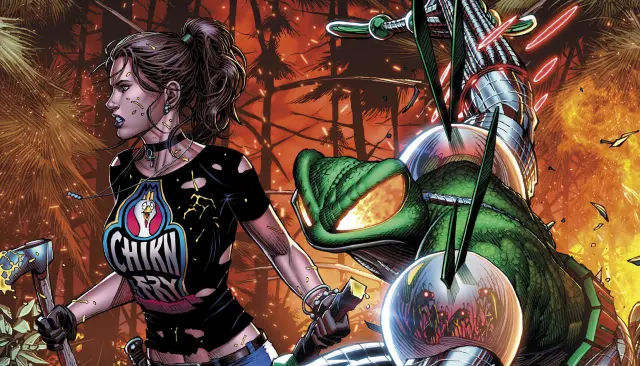
Ethan Van Sciver's Cyberfrog is outselling Marvel and DC
So new fans couldn't find their cinematic heroes in a baffling marketing disconnect that I'm sure will form the basis of many University essays in the future. People who reviewed comic books were being attacked by the companies that produced them, which in turn lead to a crowdfunded scene that saw massive sales away from the big publishers. Marvel and DC are now outsold by industry veterans like Ethan Van Sciver (Green Lantern, Batman, Cyber Frog) and complete newbies such as Richard C Meyer (Expendables), both of which have been completely vilified by the comics industry and have become the beating heart of the Comicsgate movement. The latter even took legal action against Marvel's Mark Waid for tanking a distribution deal he was working on with Arctic Press. The comics are full of life and the livestreams are quite amusing in a very "Punk Rock" fashion. I've seen no signs of the "hate group" mentality they are labelled with, though in all likelihood there will be bad actors on both sides of this debate, with quite a bit of mud being slung evenly in public.
When Kelly Sue DeConick declared "if you don't like my politics, don't buy my book" in a 2017 interview, comic fans took the instruction to heart. When she moved to DC to helm Aquaman, the book was cancelled in 2020, the first time in 10 years that Aquaman was absent from store shelves. This when Aquaman is arguably one of the stronger DC cinematic offerings of recent years. How do you not make hay with that sort of momentum?
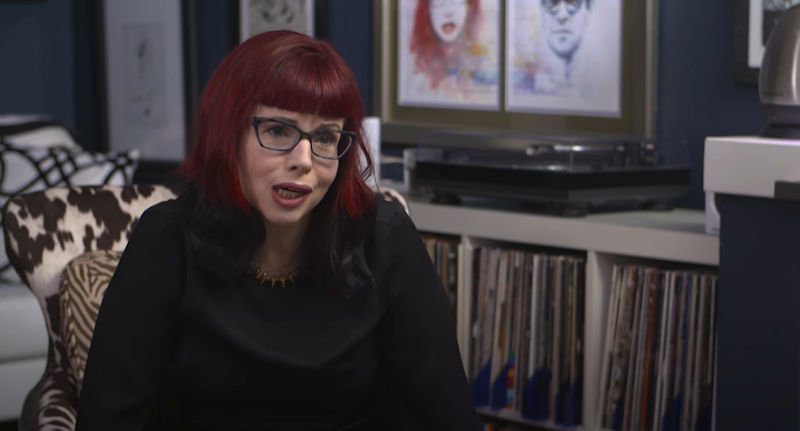
Reminiscent of a Bond villain explaining their plan in the second act. Right before they get thwarted.
2 years later, in September 2019, DeConick gave an interview lamenting the current state of comic books. "From our perspective the industry has contracted and we're very worried about comics right now." Pressed further she continued "Because stores are closing at an incredible rate. Independent comic sales are down. Mainstream comic sales are down except the top three or five books are up. Everything in the mid list is way down". This is pre-pandemic.
It's not just DeConick aggravating fans either, the number of writers and artists working at these companies hurling abuse at anyone who disagrees with them is embarrassingly long. Ironically you have some of the most vocal, like Magdalene Visaggio, now begging for rent on crowdfunding websites because they can't make a living in comics, something that is becoming increasingly frequent. If the link between abusing your customers and not having any money isn't clear to these people, then they simply aren't smart enough to be worth supporting.
Between internet "crybullying", failing to take advantage of successful media and destroying IP with woke messaging, the US comics industry have shot themselves in both feet. And then the head.
And let's just take a moment to define "woke" as used generally now, because looking online people seem to have trouble defining it. It's not that hard. Basically "woke" is two elements woven together:
1. Far-left progressive talking points presented as the only legitimate viewpoint on any topic, from race, war, equity, representation and transgender issues, while vilifying any alternative viewpoint in extremes, e.g. Nazis, bigots, fascists etc.
2. Putting the above messaging above character, story or quality in general.
See? Simple.
So back on topic, rather than import the success of the cinematic universe into comics, it seems that Disney is allowing the reverse, and the movies are importing the woke priorities of the comics office, a situation that Bob Chapek has only recently been able to move to counter by insisting on regular pitch meetings as reported in January 2022.
TERMINAL DECLINE
Owners of DC Comics, AT&T, began slashing its number of monthly titles, with only 34 solicited in March last year. Famously it cut titles down to 52 as part of the "New 52" line in 2011, and that was seen as drastic. The roster soon grew again over consecutive years, but now the trend is very much a downward spiral. Massive layoffs have been made, with AT&T managing the decline gradually - all the major long-standing Editors have been laid off, including Michele Wells, 26-year veteran marketing director, Adam Philips, 21-year veteran of sales, Stuart Schreck and, most tellingly, Events Director of 18 years, Fletcher Chu-Fong. His departure means that attendance at comic conventions is likely to be non-existent going forward, regardless of what happens with Covid.
Marvel Comics has seen similar problems. Bringing in Young Adult authors to write titles like Ms Marvel and America Chavez, culminating with a New Warriors title so fiercely loathed by both sides of the divide that it never even saw the light of day. Increasingly the company is reliant on public libraries and schools to buy its books, as consumers turn their backs. the latest YA comic, I am NOT Starfire, is the latest in a long line of books to suffer derision, DC going so far as to turn off replies to the announcement.
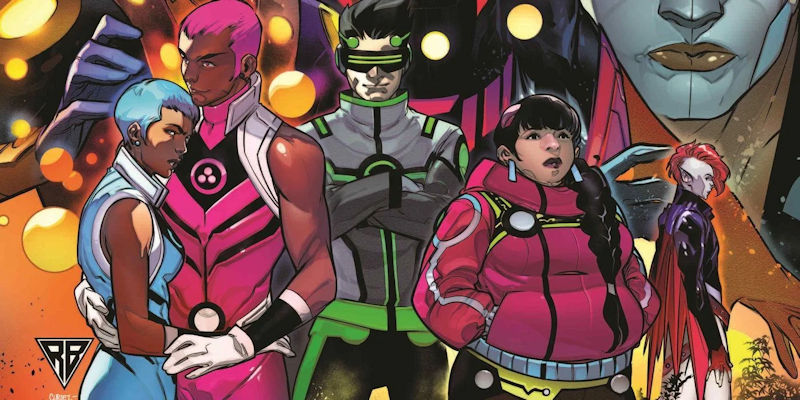
New Warriors - killed before it hit the shelves.
Writers from other woke arenas, such as Zoe Quinn who was a key player in Gamergate that moved into comics, has recently suffered the embarrassment of having alleged sales for her Goddess Mode graphic novel (Vertigo/DC) revealed to be a paltry 715 copies, despite major fanfare from the likes of Buzzfeed and Vice. The numbers were released by author Jon Del Arroz.
The CW, famous for shows such as Arrow, Batwoman, Supergirl, The Flash and the new Naomi series has been infamous for infusing woke ideology into its output, with Batgirl in particular bombing with audiences after the lead Ruby Rose declared in a trailer that she wasn't going to "Let a man take credit for a woman's work". After taking Batman's identity, gadgets and fortune, none of which she developed or earned. And they say Americans don't do irony.
Fired after one season, Rose accused the production of systematic abuse, while the show limped on with a new lead who ticked even more identity boxes, adding homeless and black to the list.
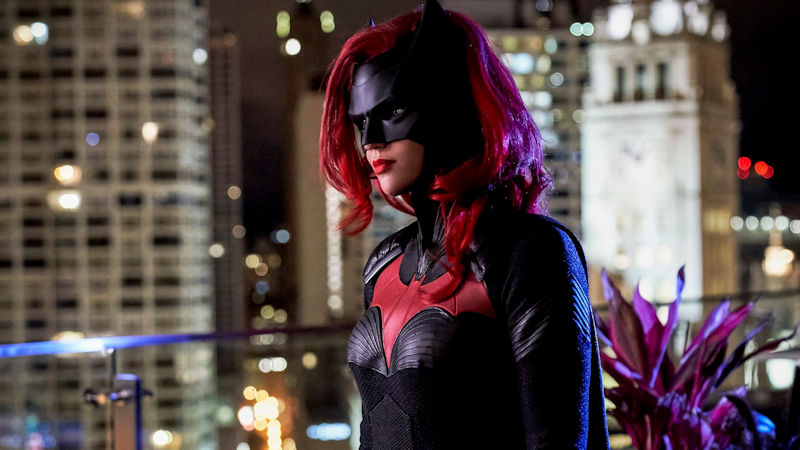
Batwoman - not a hit
In short, the last few years have been a complete shambles of backbiting, spite and rage-bait articles on both sides, which incidentally fuelled my desire to highlight why we didn't want an "animegate" on the UK Anime Network podcast 4 years ago. Sadly I was too late and the rot had set in, but that's a story for another article (my 2018 Toxic Crusaders article covers some of it here).
MISUNDERSTANDING "REPRESENTATION"
We can't overlook the importance of a misguided view of "representation" either. The commonly held view by a lot of Western Comics creators is that we must have "representation".
You can only write a character if you share their skin colour, religious beliefs or sexuality. That's fine for one or two titles, but when every book (and even the new Justice League) doesn't have any straight white male characters and you tell them "it's not for you", why should you be surprised when this audience listens to you and walks away?
Once you lose the majority of your audience, your sales will drop - fine if you only want a small audience, but if the object is profit, or even more charitably educating a wider audience on niche social issues, you don't do it by actively threatening your audience.
Worse still are the stories in these books; many read like straight up slash-fiction revenge porn - witness America Chavez and her various minority group friends attack white people who are painted as evil, clearly the fantasy of activist author Gabby Rivera, but it appeals only to her very small base and doesn't "include" anyone but her own niche tribe. The book was cancelled after one year due to poor sales. Only twitter cared.
Contrast this with the Mr T cartoon, where the titular character - who famously wore chains around his neck as a statement against slavery and changed his name legally so nobody could call him "boy" - was a positive role-model for children of any background, keeping them on a straight and narrow path to stay cool, and not be fools. Which he would pity. I live in the UK and when it came to growing up watching The A-Team, there was no doubt who my idol was in that show.
How have we gone so far backwards in 40 years so as to allow venomous misanthropes to create children's characters who spout bigotry and racism?
MANGA AND THE UNDISPUTED POWER OF POSITIVITY
So while American comics continue to eat themselves alive and attack their own customers, manga has been attracting readers like never before. There's a slew of reasons for this, so let's look at some of the most compelling.
Continuity:
Manga is generally written and drawn by one creator (plus their team). This leads to a continuity of quality in both writing and art, eschewing the US "talent-pool" approach that can lead to criticism of both aspects when lesser talent is put to work on a popular book. Generally speaking, if you enjoy volume 1 of a manga, you'll be enjoying the same art and writing through to the end of the story. You certainly won't be getting a new writer like Dan Slott waltzing in to kill a long-standing marriage as he did with Peter Parker and Mary-Jane Watson, simply because he couldn't imagine how to write a story about a loving couple in a comic book (by his own admission!).
Let there be an ending:
Manga isn't plagued by trying to keep old concepts fresh. In general, a story arc is conceived in advance, and multiple ending points are loaded into a manga to leave a satisfying ending. True, some stories are the results of popular one shots (Sweat & Soap for one) but strict editorial control by the publisher (usually responding to the market) allows manga to stay sharp and focussed.
Humility:
I can't remember the last manga I read where there wasn't a note from the creative behind the book thanking the reader for their time and attention, while promising to do their utmost to keep the reader happy. The custom is sincerely appreciated and as a reader that breeds loyalty. I'm genuinely delighted to meet Japanese creatives as I'm very much on their side when it comes to success.
Variety:
The true strength of manga. Yes, we're currently overloaded with Isekai series, but look at the breadth of imagination and variety of topics available in the manga aisle; Romantic comedy via classics such as Maison Ikkoku through to current genre darlings like Nagatoro and The Quintissential Quintuplets, historic Japanese fantasy with Demon Slayer, US inspired Super Heroics with My Hero Academia, extreme European-inspired fantasy violence with Berserk, supernatural crime thrillers like Death Note, afterlife adventure with Bleach, comic piracy with One Piece, geeky comedy with Genshiken, Comic Party, and Wotokai, martial arts insanity with Ranma 1/2 and Sumomomomo, sci-fi classics like Appleseed, Silent Mobius, Dominion... if you can imagine a genre, Manga has it covered. That's not even looking at those series that defy classification, like To Your Eternity and I Had That Same Dream Again. We may have independent like Boom's Giant Days, but it just doesn't have the allure of manga.
And let's remember, the characters in manga are almost exclusively Asian, yet millions of readers worldwide share the human experience and invest hugely into these characters.
Equality
Being a woman is no barrier to success - some of the most successful creator/owners are female, including Rumiko Takahashi, creator of mega-hits Ranma 1/2, Inu Yasha, Maison Ikkoku and Urusei Yatsura, the latter of which gets a brand new series confirmed for 4 cours this year. Having started her career in the 70's, she is unsurprisingly one of the richest women in Japan. But the list of female creators of popular series is admirably long, with all-female Studio CLAMP (Card Captor Sakura), Hiromu Arakawa (Full Metal Alchemist), Natsuki Takaya (Fruits Basket), Kore Yamazaki (Ancient Magus Bride), Kazue Kato (Blue Excorcist) and Naoko Takeuchi (Sailor Moon) to name but a few.
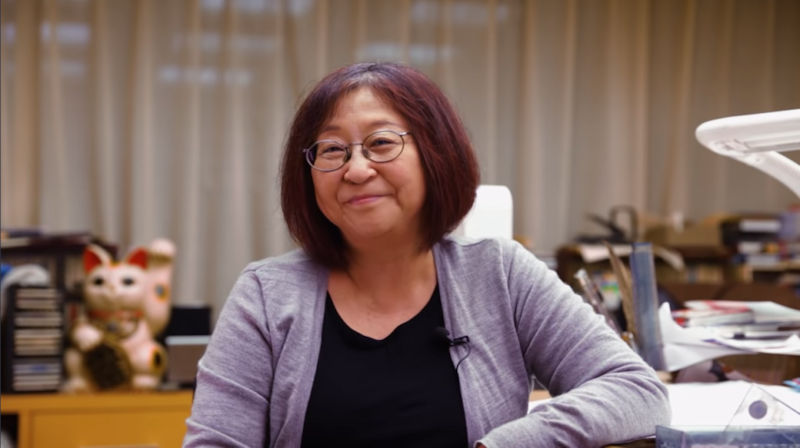
Rumiko Takahashi, a legendary Manga-ka whose works are still being translated into anime over 40 years after they debuted
Anime supporting manga
One of the main drivers of manga is the availability of Japanese content on media platforms. Anime is available not only via dedicated streaming services, but has also penetrated Netflix and Amazon Prime, the former going so far as to create it's own anime for the platform. Likewise, gaming is now at the technical point that games such as Fairy Tale, Dragon Ball and Ni No Kuni are bringing distinctive animation and immersive anime action into the interactive sphere too. This push into Japanese culture extends to manga, and luckily for the publishers, there's no shortage of imaginative and varied series to pick from.
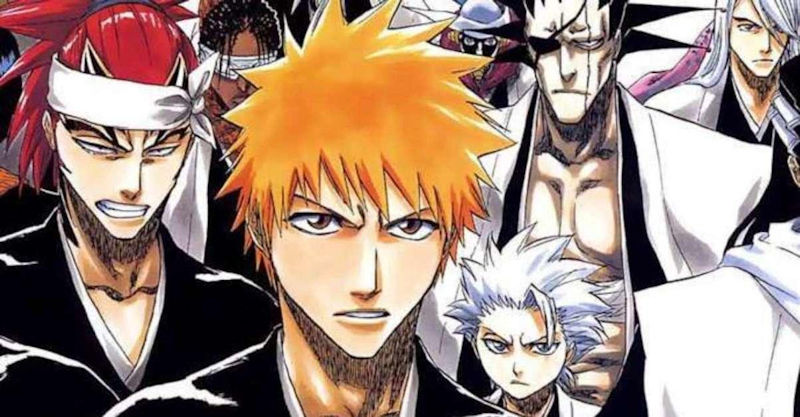
Tite Kubo's Bleach was a cross-media sensation, with the anime creating unique arcs and movies that meshed with the manga
All of this success has led to growth - manga publishers are adding new , long-running titles every month, even going so far in the case of Seven Seas of creating separate imprints - Ghost Ship for mature readers and Airship for Light Novels. When you have enough product to start categorising it, you know you're growing.
So what's next?
For US comics, the choice is a straight one - change or die. At the moment, it seems like those working in US comics are happy to double-down on their politics, even when the owners are culling management at an alarming rate. Similarly, industry professionals look at comic sales as a whole, including manga, which are rising - but only because the growth of manga is rapidly outpacing the decline of US books. This blinkered attitude to reality isn't sustainable, so it's likely that the course will change in the next few years. Sadly, much like Marvel in 1996, it may be too little, too late. It's clear that comic companies are being farmed for IP, or even being actively used by comic creatives as a way into a Netflix deal. It's odd to see people who care so little about the medium being in charge of it.
Conversely, manga is being championed by creatives and publishing houses that are outgoing and positive in almost every sense. There's a feeling of communal pride and joy across Japanese comics, which offers a far greater spread of genres, ideas and great art than what we're seeing in the West.
So long as US Comics continue to destructively change their major heroes in lieu of new ideas and alienate their fragile audience, it can only continue to lose ground to the innovative and imaginative Eastern powerhouse of manga. While I hope they wise up and start treating their whole audience with a bit of respect, I won't shed any tears if the house of woke cards collapses in its current state either.
Ultimately then, manga isn't killing the US comics industry, it's just giving readers a place to go while they kill themselves.
And yes, I'm still bitter at what Tini Howard did to Death's Head.
Follow A.I. on Twitter and Like us on Facebook to get all the latest site updates